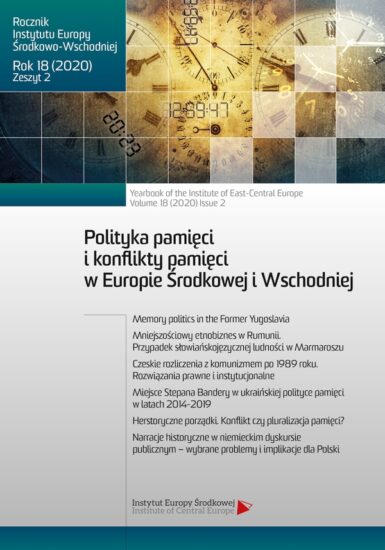Afiliacja: Institute for Political History, Hungary
Strony: 123-142
Wydanie: Lublin 2020
DOI: https://doi.org/10.36874/RIESW.2020.2.6
Sposób cytowania: G. Egry, The greatest catastrophe of (post-)colonial Central Europe? The 100th years anniversary of Trianon and official politics of memory in Hungary,„Rocznik Instytutu Europy Środkowo-Wschodniej” 18(2020), z. 2, s. 123-142, DOI: https://doi.org/10.36874/RIESW.2020.2.6.
Słowa kluczowe: Europa Środkowa, polityka pamięci, postkolonializm, Trianon, Węgry
Abstrakt: The Treaty of Trianon (hereinafter Trianon), the enormous losses of territory and co-ethnics, and the shaking of Hungary’s status as a dominant power in the Carpathian Basin imputed a tragic understanding of contemporary Hungarian history on the Hungarian society, invoking the idea of a trauma lasting even today. Trianon’s understanding became a divisive issue for political parties after 1989, highlighting the ever-deeper divisions between right and left-liberals, since 2010. Its “overcoming” is a flagship project of the government’s politics of identity, with modest success so far. Thus, the 100th anniversary was a crucial moment as a test case for a self-professed nationalist, traditionalist, conservative political force for manifesting a comprehensive politics of memory. In the light of the newly built monument at the heart of Budapest, with the Hungarian names of all localities on the territory of pre- 1918 Hungary inscribed on its wall, a cautious shifting back to territorial revisionism was expected. In this article, I will argue that even with such tendencies being, obviously, present, the official commemorations were crafted with a surprising message, that attempts to turn the canonical understanding of Trianon upside down and reframe it into a common catastrophe of Central Europe. Doing so places the consequences in the context of the decolonization of history, the present decline of empires, and the emergence of nation-states while combining it with important tropes of the traditional, anti-liberal and revisionist Trianon discourse. Nevertheless, the result is a transparently political message that is not only driven by easily visible actual political goals (V4 and Central European cooperation), but one that detaches the politics of memory from historical references and legacies and creates a set of shallow symbols for utter instrumentalization, to recombine at will, in a vulgarised sense of post-modernism.
Bibliografia:
Babucs Z., Száz éve feszítették keresztre, de a magyar él és élni akar!, felvidek.ma, 04.06.2020, https://felvidek.ma/2020/06/szaz-eve-feszitettek-keresztre-de-a-magyar-el-es-elni-akar/ [07.08.2020], https://doi.org/10.1556/2065.181.2020.10.12.
Békés M., A Trianon-egyenlet feloldása, mandinder.hu, 30.06.2020, https://mandiner.hu/cikk/20200630_a_trianon_egyenlet_feloldasa_trianon_101 [31.07.2020].
Berecz Á., Empty Signs, Historical Imaginaries: The Entangled Nationalization of Names and Naming in a Late Habsburg Borderland, New York – London 2020.
Egry G., A Fate for a Nation? Concepts of History and the Nation in Hungarian Politics, 1989-2010, [in:] Thinking Through Transition. Liberal Democracy, Authoritarian Pasts, and Intellectual History in East Central Europe After 1989, eds. M. Kopecek, P. Wcislik, Budapest – New York 2015, p. 505-524, https://doi.org/10.17356/ieejsp.v3i3.398.
Egry G., Beyond Electioneering. Minority Hungarians and the Vision of National Unification, [in:] Brave New Hungary. Mapping the “System of National Cooperation”, eds. J. Mátyás, Kovács, B. Trencsényi, Lanham (MD) 2019, p. 73-94.
Egry G., Otthonosság és idegenség. Identitáspolitika és nemzetfelfogás Magyarországon a rendszerváltás óta, Budapest 2010.
Egry G., Végre egy irredenta emlékmű?, hvg.hu, 18.04.2019, https://m.hvg.hu/360/hetilap360/2019/16/20191618velemeny2 [31.07.2020].
Egy országos közvéleménykutatás eredményei, trianon100.hu, 01.06.2020, https://trianon100.hu/cikk/egy-orszagos-kozvelemenykutatas-eredmenyei [31.07.2020].
Feischmidt M., A magyar nacionalizmus autenticitás-diskurzusainak szimbolikus térfoglalása Erdélyben, [in:] Erdély-(de)konstrukciók, ed. M. Feischmidt, Budapest 2005, p. 7-32.
Feischmidt M., Előszó, [in:] Nemzetdiskurzusok a mindennapokban és a nacionalizmus populáris kultúrája, eds. M. Feischmidt et al., Budapest 2014, p. 23-24.
Gerő A., Városok helyett magyar családokkal emlékezzünk Trianonra!, 24.hu, 13.04.2019, https://24.hu/kozelet/2019/04/13/gero-andras-trianon-emlekmu-varos-csalad-nev/ [07.08.2020].
Hopkins V., How Orbán’s decade in power changed Hungary, “Financial Times”, 21.05.2020, https://www.ft.com/content/414f202e-9996-11ea-8b5b-63f7c5c86bef [31.07.2020].
Kovács É., Overcoming History through Trauma. The Hungarian Historikerstreit, „European Review” 2016, vol. 24, no. 4, p. 523-534, https://doi.org/10.1017/s1062798716000065.
Kovács É., Trianon, avagy a traumatikus fordulat a magyar történetírásban, “Korall” 2015, vol. 16, no. 59, p. 82-107.
Laczó F., Totalitarianism without Perpetrators? Politics of History in the “System of National Cooperation”, [in:] Brave New Hungary. Mapping the “System of National Cooperation”, eds. J. M. Kovács, B. Trencsényi, Lanham (MD) 2019, p. 29-50.
Mark J., The Unfinished Revolution. Making Sense of the Communist Past in Central and Eastern Europe, New Haven – London 2010.
Máthé Á., Tíz tézis Trianonról, “Kommentár” 2020/2, kommentar.hu, http://www.kommentar.info.hu/cikk/2020/2/tiz-tezis-trianonrol [31.07.2020].
Megható videókkal segítik az összetartozást Trianon századik évfordulóján, origo.hu, 18.05.2020, https://www.origo.hu/kultura/20200518-kisfilmek-a-trianoni-bekeszerzodes-alairasanak-szazadik-evfordulojara.html [31.07.2020].
Mező A., A magyar hivatalos helységnévadás, Budapest 1982.
Mijnssen I., Die Schmach von Trianon: wie ein ungerechter Friede Ungarn und seine Nachbarn seit einem Jahrhundert prägt, “Neue Zürcher Zeitung”, nzz.ch, 03.06.2020, https://www.nzz.ch/international/vertrag-von-trianon-ungarns-trauma-und-nationaler-mythos-ld.1558309 [31.07.2020].
Parliamentary Declaration on the Defense of National Identity, https://www.parlament.hu/irom41/10760/10760.pdf [31.07.2020].
Prime Minister Viktor Orbán’s commemoration speech, abouthungary.hu, 06.06.2020, http://abouthungary.hu/speeches-and-remarks/primeminister-viktor-orbans-commemoration-speech-trianon/ [31.07.2020].
Prime Minister Orbán: Within the next few years Central Europe will be the engine of the European economy’s growth, abouthungary.hu, 19.11.2020, http://abouthungary.hu/news-in-brief/pm-orban-within-the-next-few-years-central-europe-will-be-the-engine-of-the-european-economys-growth/ [31.07.2020].
Pók A., The Politics of Hatred in the Middle of Europe. Scapegoating in Twentieth Century Hungary. History and Historiography, Szombathely 2009.
Romsics G., Towards Negative Possession of Identity, [in:] Populism, Memory and Minority Rights: Central and Eastern European Issues in Global Perspective, ed. A.-M. Bíró, Leiden – Boston (MA), Brill, 2018, p. 89-129, https://doi.org/10.1163/9789004386426_007.
Romsics G., Trianon a Házban. A Trianon-fogalom megjelenései és funkciói a pártok diskurzusaiban az első három parlamenti ciklus idején (1990-2002), [in:] Az emlékezet konstrukciói, eds. G. Czoch, Cs. Fedinec, Budapest 2006, p. 35-52.
Szarka L., A közös történelem nehéz öröksége. Viták nemzet és állam historikumáról, „REGIO” 2014, vol. 22, no. 1, p. 156-192, https://doi.org/10.17355/rkkpt.v22i1.10.
Trencsényi B., A nép lelke. Nemzetkarakterológiai viták Kelet-Európában, Budapest 2011.
Trencsényi B., The Politics of “National Character”: A Study in Interwar East European Thought, Abingdon 2012, https://doi.org/10.4324/9780203806708.
Ungváry K., Politikailag és morálisan is védhetetlen üzenetet küld a kormány, nepszava.hu, 04.06.2020, https://nepszava.hu/3080312_politikailag-es-moralisan-is-vedhetetlen-uzenetet-kuld-a-kormany–interju-ungvary-krisztiannal [31.06. 2020].
Zeidler M., Ideas on Territorial Revision in Hungary: 1920-1945, Boulder (CO) 2007.
Słowa kluczowe: Europa Środkowa, polityka pamięci, postkolonializm, Trianon, Węgry
PDF: Pobierz